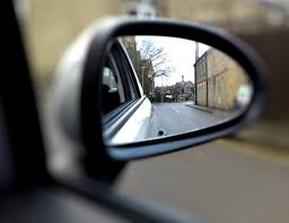|
Last Sunday in the Brookside Institute "Walking Wisely: An Introduction to Biblical Ethics" class, we turned the corner away from laying foundations for thinking ethically, to looking more closely at specific issues that deserve some ethical consideration. And the first thing we looked at are what I like to call "ethical blindspots." We all know what a blindspot is in our cars, right? They're those spots we can't see using the side or rear-view mirrors. If we're not careful, there can be a car in our blindspot that we're not even aware of. And if we try to move into that space, accidents happen! In the same way, I think there can be ethical blindspots in our lives - issues that deserve moral reflection that we're not even aware of - perhaps because of all the good that goes along with the issue, because the issues are new, or because of the cultural "water" we swim in. Whatever the reason, it's easy for these issues to NOT be on our radar screen. The danger is that these "ethical blindspots" deserve moral reflection and moral attention - and when we move into the space these issues occupy without giving them the moral reflection they're due, crashes can happen. So last week we looked at three issues that can be "ethical blindspots" in 21st century America - materialism, technology, and hurry. Material possessions aren't necessarily bad in-and-of themselves. Technology can be used for great good. And it's not wrong to be busy. But when we overlook the potential dangers and abuses that accompany each of these things, we've got some ethical blindspots to address. I'm not going to recycle that entire class session here. Instead, I simply want to ask the same questions about each issue that we walked through in class (we had excellent discussion, by the way!). I encourage you to ask these same questions about each of these issues, and begin to give them some moral reflection.
The even larger issue is for us to acknowledge that God cares about how we live - even in some of these "nooks and crannies" of our lives that we may not always think about. When we couple this idea together with the potential danger of ethical blindspots - things that can derail us that we're not even aware of - we should want to give moral reflection to these areas of our lives. The goal? Not ethical paranoia but an authentic desire to "walk wisely" and "put on the new self, which is being renewed in knowledge in the image of its Creator" (Colossians 3:10).
0 Comments
Leave a Reply. |
Tim WiebeChristian. Husband. Father. Pastor. Learner. Contributor. Reader. Categories
All
Archives
June 2024
|
© 2014-2024 | 11607 M Circle, Omaha NE, 68137 | www.thebrooksideinstitute.net


 RSS Feed
RSS Feed
